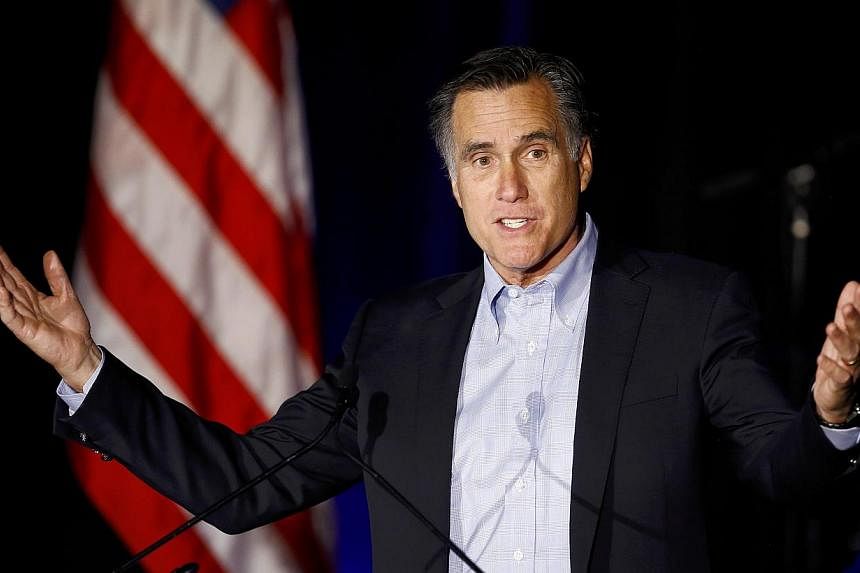WASHINGTON (AFP) - Former Republican presidential nominee Mitt Romney said Friday he will not run for the White House again in 2016, ending weeks of intense speculation that he would mount a third campaign.
"After putting considerable thought into making another run for president, I've decided it is best to give other leaders in the party the opportunity to become our next nominee," Romney said during a conference call with supporters.
"I believe that one of our next generation of Republican leaders, one who may not be as well known as I am today, one who has not yet taken their message across the country, one who is just getting started, may well emerge as being better able to defeat the Democrat nominee."
The announcement essentially ends Romney's three-week public flirtation with a potential third campaign.
On Jan 9, he told donors he remained interested in the White House.
He subsequently gave two speeches, including one to the Republican National Committee, laying out his vision for themes to embrace should Republicans want to regain the White House after eight years of President Barack Obama.
Romney, 67, said Friday it was "unlikely" that circumstances would change his mind about running.
"Accordingly, I'm not... taking donations; I'm not hiring a campaign team," he said.
And yet Romney expressed confidence he could have won, telling supporters he would have had enough funding to mount a campaign and noted he was well ahead in a recent Republican poll.
With his foreign policy focus and call for battling income inequality, "I would have the best chance of beating the eventual Democrat nominee," Romney said.
Potential candidate Jeb Bush, perhaps the person with the most to gain from Romney dropping out because the two operate in the same middle lane of the Republican establishment, was quick to praise his would-be rival as a "patriot" and party leader.
"Though I'm sure today's decision was not easy, I know that Mitt Romney will never stop advocating for renewing America's promise," Bush, a former Florida governor and the son and brother of two presidents, said in a statement.
Bush announced in December that he was "actively" exploring a presidential run.
BOON FOR BUSH
Romney and Bush were seen to be headed for a heated clash in the early months of the campaign, battling for crucial donor support and the backing of politicos, and hiring top campaign staff.
The pair met in Utah last week.
"Politics is a zero sum game. There's always a winner and a loser in every transaction," Quinnipiac University Poll assistant director Peter Brown told AFP of Romney's announcement.
"The winner is Jeb Bush. Bush just lost his major competitor to be the center right candidate in the Republican Party."
Romney, a wealthy businessman and former governor of Massachusetts, said in recent speeches that the party needed to make income inequality and poverty alleviation key planks in the presidential race.
He amassed a fortune as a venture capitalist, and Obama's 2012 campaign successfully painted him as an out-of-touch millionaire.
Romney joked about his own financial comfort Wednesday, saying money was no motivator for a presidential run.
"I'm not even thinking about getting rich from the speaking fees after I leave office," he quipped.
"As you no doubt heard, I'm already rich."
Romney's campaign suffered in 2012 when a tape surfaced of him saying "47 per cent" of Americans would never vote for him because they were dependent on government benefits.
He had also struggled to counter the image that was stuck on him in the 2012 primary battles and beyond - that of a policy flip-flopper with awkward social skills and questionable concern for America's struggling middle class.
Despite lingering doubts about his opposition on hot-button social issues like gay marriage and abortion, he handily won the Republican nomination that year.
He lost the nomination to John McCain in 2008, the year Democratic nominee Barack Obama was elected president.
Romney may not have had such a smooth ride this round, with at least a dozen Republicans circling in the campaign pool, apparently poised to officially launch presidential campaigns.
One is Senator Rand Paul, who emitted what amounted to a political sigh of relief on Twitter.
"I hope to work together with Mitt to grow our party and lead our country forward," Paul said.

